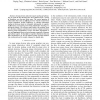Free Online Productivity Tools
i2Speak
i2Symbol
i2OCR
iTex2Img
iWeb2Print
iWeb2Shot
i2Type
iPdf2Split
iPdf2Merge
i2Bopomofo
i2Arabic
i2Style
i2Image
i2PDF
iLatex2Rtf
Sci2ools
111
Voted
HICSS
2016
IEEE
2016
IEEE
Information Sharing for Collective Sensemaking
Abstract—Group decision tasks that require pooling of information to reach the best decision have been studied across a variety of disciplines over the past thirty years. The crucial question of what makes these tasks so difficult, however remains unanswered. Various hypotheses include inefficiency in sharing information leading to decisions based on incomplete information or cognitive inefficiencies in processing and storing information arriving in a piecemeal fashion. The present study attacks this problem from two directions. Human experiments are used to compare decisions between groups manipulated to receive and share information in raw and aggregated forms and mixed groups comprised of humans and software agents. To shed light on cognitive limitations that may affect performance, an ACT-R cognitive model of group members was constructed and its results compared to human data.
Biometrics | HICSS 2016 |
Related Content
| Added | 03 Apr 2016 |
| Updated | 03 Apr 2016 |
| Type | Journal |
| Year | 2016 |
| Where | HICSS |
| Authors | Yuqing Tang, Christian Lebiere, Katia P. Sycara, Don Morrison, Michael Lewis 0001, Paul R. Smart |
Comments (0)

